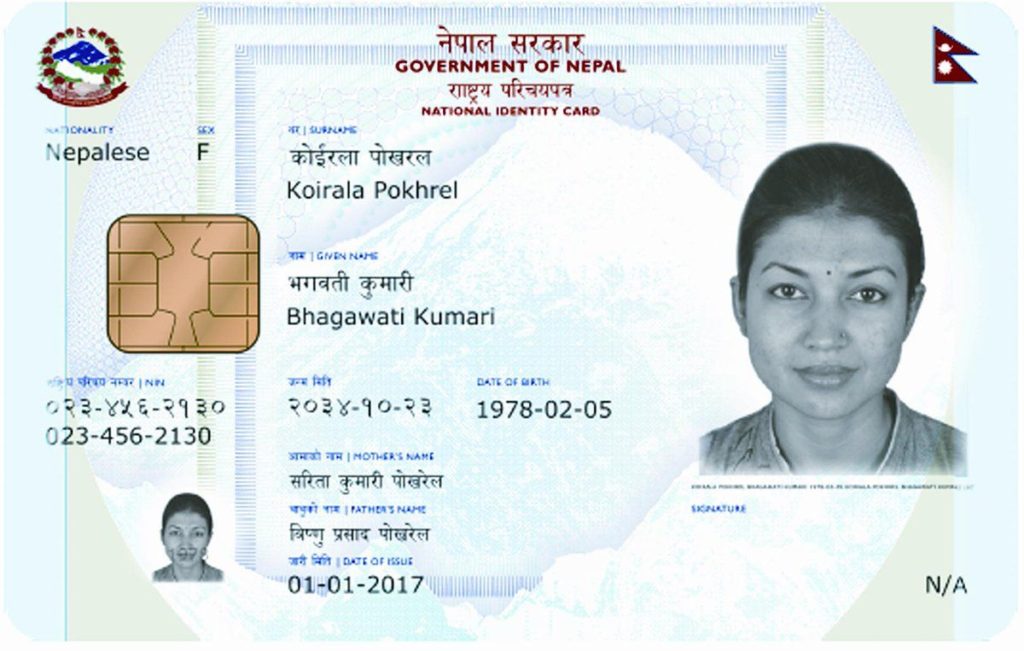State increases surveillance on citizens

Kathmandu / July 2: The government has made it mandatory for the citizens to present the National Identity Card to avail any kind of government services and works. The decision will be implemented in three phases starting from July 16, the first day of the new fiscal year. The government has already instructed the citizens to get the identification number. However, the government has not yet prepared the required infrastructure and manpower for the implementation of the decision.
The new system, without proper security measures, is likely to breach the privacy of the citizens as the government can get easy access to the citizen’s property details, bank account, income, expenses, taxes, domestic and international travel details, daily activities among other vital information through the National Identity Card number.
Experts have pointed out the likelihood that the privacy of an individual may be breached and personal details potentially leaked in absence of high security alertness and precautions.
Experts said that the government should pay attention to personal privacy before making the National ID Card mandatory.
Administration and legal expert Kashi Raj Dahal said that many problems may arise if the national identity card is made mandatory without giving attention towards personal privacy and infrastructure development. The Constitution of Nepal outlines that personnel privacy cannot be breached.
Dahal said, “The Constitution of Nepal has declared the right to privacy as a fundamental right. Therefore, personal privacy should be given attention before deciding to make national identity cards mandatory.”
Article 28 of the constitution states, “The privacy of any person, his or her residence, property, document, data, correspondence and matters relating to his or her character shall, except in accordance with law, be inviolable.”
Dahal emphasized that the infrastructure development, competency of the employees and public awareness should be enhanced before making the national identity card mandatory.
The government has also decided to make national identity cards mandatory for the social security allowances, health insurance, pensions, driving license, company registration and renewal among others.
The government has made it mandatory to have a national identity card number for opening a bank account, purchasing a telephone or SIM card, and buying and selling property starting from January 14 next year. The department is going to connect the services provided by the Inland Revenue Department, Health Service Board, Office of The Company Registrar, Bank and Department of Land Revenue with the National ID Card. The traffic police can apply the system of reading the license number and digital license from the QR code in the National ID Card. The Department of National Id and Civil Registration (DoNIDCR) said that it is doing its homework to make the National ID Card number mandatory even for ‘booking’ an air ticket.
Yubaraj Kattel, the director general of the DoNIDCR said, “We are going to make the National ID Card number mandatory for all public services. According to the DoNIDCR, children, individuals unable to care for themselves, disabled, helpless, and senior citizens above the age of 90 are not required to obtain a National ID Card.
So far, the government has spent more than Rs 5 billion on creating the National ID Card numbers and distributing those cards. This program started four years ago. According to the DoNIDCR, it costs over Rs 300 for the state to print a card and deliver it to the citizens.
The government said that the National ID Card will be implemented in three phases throughout the country. In the first phase, the DoNIDCR will make it mandatory for using the National ID Card number in 28 districts of Terai-Madhesh, Inner Madhesh, hill region and Kathmandu Valley from July 16. It includes districts such as Jhapa, Morang, Chitwan, Kaski, Tanahu, Rupandehi, Kapilvastu, Dang, Banke, Bardia, Surkhet, Kailali and Kanchanpur.
The DoNIDCR said that the National ID Card number will become mandatory in 38 more districts starting from January 14 in the second phase. In the third phase, starting from July 16, 2025, the national identity card number will be required for all government works in 11 districts of the Himalayan region.
According to the DoNIDCR, the data of 160 million citizens has been collected so far. Similarly, about 4 million cards have been printed and about 700,000 cards have been delivered to the citizens.
